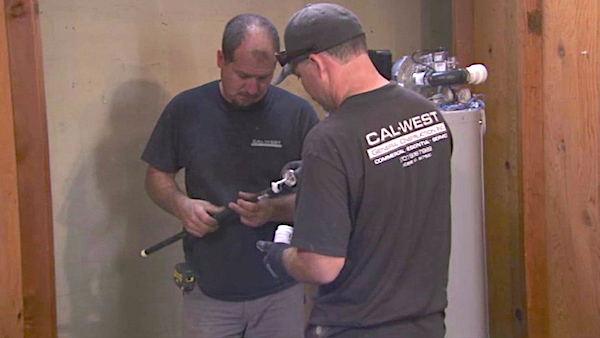Residential water heaters are often taken for granted. They’re usually installed in a closet or basement or other out-of-the-way spot, and it generally costs less to replace a standard water tank system than other home systems, so many homeowners don’t see water heater maintenance as an urgent priority.
But proper maintenance almost always pays off in the long run, and not just for homeowners. While contractors may benefit from the additional business generated by emergency service calls, those one-time sales aren’t nearly as important as the name recognition and trust they can cultivate with maintenance agreements that help insure optimal product performance and longevity.
Unfortunately, many water heater service professionals either don’t recognize the value of maintenance plans, or don’t know how to effectively communicate the advantages to their customers.

Pay a little now or a lot later
Over the life of an appliance, the minor cost of an annual inspection or tune-up can help save homeowners in multiple ways. Inspections can catch small issues before they become major problems, which in turn helps extend the life of the water heater. In addition, regular service helps ensure efficient performance, which can reduce energy costs and provide for consistent product performance.
Preventive maintenance also helps protect homeowners from the inconvenience and high costs associated with emergency service. Unplanned repairs tend to cost more than regular maintenance and can interrupt household routines, which can be more than a nuisance. Missed work and the disruption of planned events like family vacations can add to the financial burden of emergency water heater repair.
Many successful contractors recognize that it’s in their own interest to help customers avoid emergencies, no matter how lucrative they can be. Routine service calls don’t generate a lot of income, but they build name recognition and, more importantly, lasting relationships. That can be a vital distinction when it’s time to replace an existing water heater, or in the unfortunate event of an emergency.

Maintenance vs. warranty
One misconception that contributes significantly to deferred maintenance is not having a full understanding of a manufacturer’s warranty. Many homeowners assume that the warranty will cover most repairs. Why pay for even minor service now if you expect your warranty to cover the cost of major repairs later?
But the scope of a warranty is limited and very specific, covering demonstrable defects in manufacturing. Proper installation and application and, in some cases, even documentation that the recommended maintenance has been performed, are typically required in order to maintain a valid warranty. Even then, warranties typically don’t apply to local conditions that can significantly affect water heater performance, like water quality, climate, air quality and the hardness of the water supply.
A warranty is an important tool that homeowners should be familiar with. But the best warranty will not apply to the simple wear and tear of daily use or issues arising from local adverse conditions.

Connect with homeowners
It doesn’t take salesmanship in order to maximize the long-term advantages of maintenance agreements. In many cases, a few simple tweaks to existing workflows can be extraordinarily effective tools to open new opportunities for preventive maintenance.
One simple enhancement is to follow the example of HVAC contractors and leverage seasonality. If water heater use tends to go up in your service area during colder months, try to schedule new maintenance service calls in late summer or fall. Employ multiple seasonal opportunities to connect with customers, from back to school, winter holidays, summer vacation or the switch to Daylight Savings Time, and set up regular seasonal reminders for follow-ups.
The single best time for a maintenance agreement conversation is immediately after a substantial repair or emergency service. Homeowners who have recently experienced the cost and disruption of a major equipment repair or unplanned replacement are in a position to recognize the likely payoff of an investment in ongoing service.
Ultimately, communication is the most crucial tool for connecting with customers about preventive maintenance service. Contractors who can effectively and objectively relay information to homeowners are in a position to relieve the anxiety many of them feel about water heaters and other large home appliances. By educating them and offering a convenient, affordable solution, you can establish your company as the trusted solution for any foreseeable service.
 Dustin Bowerman is director of corporate training and product support for Bradford White Corporation, a full-line manufacturer of residential, commercial and industrial products for water heating, space heating, combination heating and storage applications. For more information, visit www.bradfordwhitecorporation.com.
Dustin Bowerman is director of corporate training and product support for Bradford White Corporation, a full-line manufacturer of residential, commercial and industrial products for water heating, space heating, combination heating and storage applications. For more information, visit www.bradfordwhitecorporation.com.




Join the conversation: